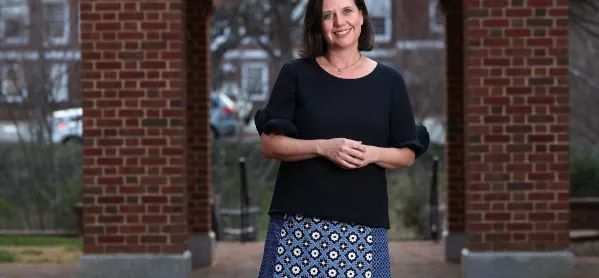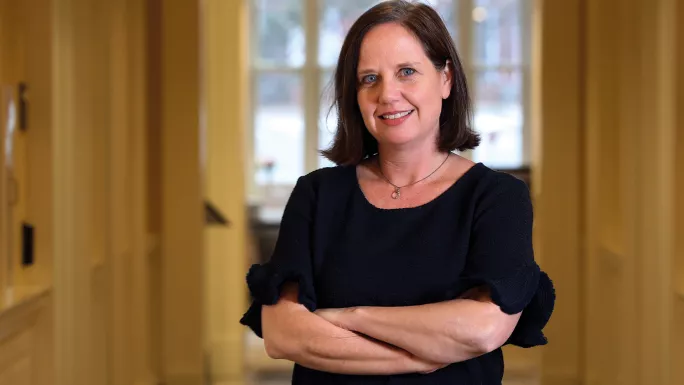- Home
- Tes talks to...Bridget Hamre
Tes talks to...Bridget Hamre

Bridget Hamre looks at our current education system in bewilderment: we have a system, she says, that works against the very thing that is most important for learning.
“Almost all teachers enter the profession because they want to develop positive relationships with students,” explains the associate director for the Center for Advanced Study of Teaching and Learning at the University of Virginia’s Curry School of Education. “But once they begin teaching, most of the focus is on academic outcomes.
“As a society, we have a lot of work to do to recognise that relationships are: 1) foundational to all outcomes - children won’t make academic outcomes if they aren’t positively engaged; and 2) [something we need to care about as] an outcome for their own purpose.”
Hamre has spent much of her career examining student-teacher relationships.
The research base that relationships are important is now unequivocal, she believes.
“We know now, from many very good, longitudinal studies, that having close relationships with a teacher can be exceptionally influential in a child’s life,” she explains. “We know from studies of young children, middle childhood and adolescents that having caring adults is foundational to their success. We [also] know that success in life requires being able to negotiate challenging relationships and form positive connections.
“Children learn these skills through the interactions they have every day - and the models they have in their relationships with teachers really set them on a pathway in the future. So if we are able to help children know how to form positive relationships early in schooling, they will carry this forward with them later in school and in life.”
Hamre adds that good relationships, as she mentioned, have a direct impact on attainment, too.
“What ultimately matters for students is the extent to which they feel a sense of connection to their teacher,” she explains. “This helps promote their connection to an engagement with what is happening in the classroom.”
Can you relate?
Hamre admits measuring relationships can prove complex: it is difficult to quantify a relationship and therefore studies of relationships tend to rely on qualitative data.
With the youngest students, relationships are measured by teacher report in most instances, although a few studies of young children have had them self-report, or even use methods such as drawing pictures of themselves and their teachers. Researchers then code these pictures and the “narratives” children tell about them to help understand how connected they feel to their teachers.
Starting around the age of 7, students can more reliably self-report on their relationships, says Hamre. There are also some clear hallmarks of a good relationship that you can see by observing, she says.
“[Behaviour and relationships] are interconnected in several ways,” she explains. “We know, for example, that students are less likely to display problem behaviours in a classroom if they have positive relationships with teachers. There are a variety of reasons for this: [for example] they may be more engaged in the classroom and thus less likely to misbehave because they are bought into what the teacher is doing.”
And she adds that when a relationship is bad, you can also observe clear patterns of teacher behaviour.
“Once a teacher has a lot of conflict with a student, they “see” all the moments when that student isn’t meeting expectations and miss the many moments when the student is meeting expectations,” she explains. “In our intervention work we really work to break this natural pattern.”
That’s not to say that where there is a good relationship there are no behaviour problems. Rather, she argues that for some children the issues will be less, but with others having a strong relationship can mean that when times are tough, the child will be more likely to go and seek support from their teacher, rather than have the problem escalate. Or if the teacher does intervene, the child is more likely to respond positively because that relationship is already established.
What can be frustrating for teachers, though, is that they can put all their efforts into creating a strong relationship with a child and still struggle to make a connection. The temptation would be to forensically self-analyse, but Hamre says it may be down to the previous relationships the child has had in the school.
“In one early study I did in this area, we showed that students who had difficult relationships with teachers in kindergarten demonstrated poorer outcomes all the way through to eighth grade - lower grades and greater likelihood of disciplinary infractions,” she explains.
Thankfully, she and her colleagues have gone on to demonstrate how targeted interventions can reverse the damage caused.
“One recent study that is really compelling is a large intervention study conducted by some of my UVA colleagues, led by Amanda Williford. They examined the impacts of Banking Time, an intervention developed by Bob Pianta, designed to improve the quality of teachers’ relationships with children who displayed significant behavioural challenges.”
Banking on improvements
In Banking Time, teachers spend brief periods of time, just 5-10 minutes a day, a few times a week, one-to-one with children with whom they are struggling. They also learn a set of strategies for how to interact with children during these periods. In particular, they work to be non-directive and follow the child’s lead. And they also convey relational messages - like “I’m here to help if you need me” and “I care about you”.
“They were able to show that children in the classrooms where teachers were implementing Banking Time had improved behaviour over time,” Hamre says.
She adds that the study provided another, unexpected, piece of evidence on the benefits of strong teacher-student relationships: those students who experienced Banking Time sessions with their teachers also appeared to show more adaptive stress responses as measured by cortisol - they were less stressed out in the classroom.
“Being in a classroom is often very stressful for students - they have to perform while also having to navigate challenging peer connections.” she says. “Even the most competent students find being in the classroom a challenge. And when we are feeling stressed we aren’t able to give our full attention to other things - so stressed-out children are simply less likely to be engaged in the classroom.
“Anything we can do to make the classroom setting less stressful will allow students to more deeply engage and thrive. If they know there is someone there to help them when they need it, they can put more of their attention on their learning and work.”

Do teachers really need separate one-to-one time to reap these benefits?
Hamre says a lot of what teachers would need to work on to build relationships is common sense. But she adds that the system now makes things difficult because of a lack of time given to teachers to talk with their students.
“The most important thing that teachers can do is really take the time to get to know each student.” Hamre says. “Teachers are so busy, but it’s important that they find time to talk with students about their lives outside of school - to communicate that they care about them as people.
“Teachers can also make a point of really understanding children’s ideas and perspectives and know that these are valued. Some children make this easy - but the most effective teachers really make a point of reaching out to all the students in their classrooms, the quiet ones and the ones that may at first get on their nerves.”
She stresses that this is not about giving them an easy ride, nor letting them do what they want. Positive relationships, she says, require a commitment to expecting children to learn at the highest levels.
“Especially as students get older, it’s really important to ensure that students know that teachers hold high expectations for them - adolescents say this is really critical to forming positive relationships,” she explains.
“It’s not just about being nice but about creating a classroom environment in which students know they will be challenged and given the support they need to succeed - and that teachers have faith in their ability to succeed.”
It sounds easy, but Hamre says too often she sees classrooms where accountability and obsession with results gets in the way.
As long as that barrier remains, she argues, we will be preventing the very thing that this system seeks to ensure: successful academic outcomes.
“Without the ability to form positive relationships with students,” she says, “even the very best instruction will be wasted.”
Fiona Hughes is a freelance writer
Keep reading for just £1 per month
You've reached your limit of free articles this month. Subscribe for £1 per month for three months and get:
- Unlimited access to all Tes magazine content
- Exclusive subscriber-only stories
- Award-winning email newsletters


